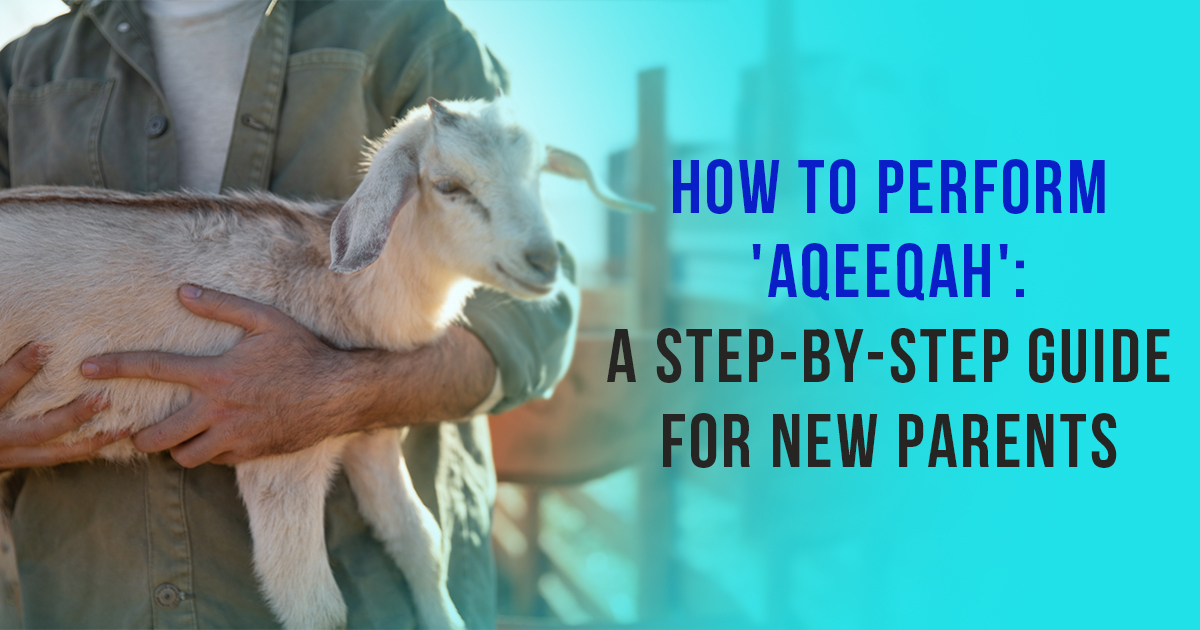We use cookies to make your experience better. To comply with the new e-Privacy directive, we need to ask for your consent to set the cookies. Learn more.
How to Perform 'Aqeeqah': A Step-by-Step Guide for New Parents

How to Perform 'Aqeeqah': A Step-by-Step Guide for New Parents
The birth of a child is a momentous occasion in any family, and in Islam, it is marked by 'Aqeeqah', a significant Sunnah that entails a series of rituals and acts of thanksgiving. This guide by Darussalam will take you through the process step-by-step, ensuring that new parents can fulfill this beautiful Islamic tradition with ease and peace of mind.
Understanding 'Aqeeqah'
'Aqeeqah is an Islamic tradition that is performed on the occasion of a child's birth. The ritual acts as a means to express gratitude to Allah for the blessing of the newborn and is believed to bring protection for the child.
The Significance of 'Aqeeqah in Islam
- It serves as a means of welcoming the child into the Muslim community.
- It is a way of giving thanks for the joy and responsibility that comes with the new addition to the family.
Preparations for 'Aqeeqah
Determining the Best Time to Perform 'Aqeeqah
The preferred time for performing 'Aqeeqah is on the seventh day after the birth of the child.
If this is not possible, it can be done on the fourteenth, twenty-first, or when possible.
Choosing the Sacrificial Animal
For a boy, two sheep or goats should be sacrificed, and for a girl, one.
The animals should be healthy, free from faults, and of the appropriate age as per Islamic guidelines.
Step-by-Step Guide to Performing 'Aqeeqah
Step 1: Preparing the Sacrificial Animal
Purchase the animal(s) ahead of time, ensuring they meet the stipulated requirements.
Care for the animal, treating it with kindness and respect until the time of the sacrifice.
Step 2: Organizing the Ceremony
Select a day, preferably the seventh day after birth, and choose a suitable location.
Invite family, friends, and members of the community to share in the joyous occasion.
Step 3: Performing the Sacrifice
Prior to the sacrifice, it is recommended that the child is given a name and that his/her hair is shaved (a practice known as Tahneek).
Recite the intention (niyyah) and the Takbeerat - "Bismillahi, Allahu Akbar" (In the name of Allah, Allah is the Greatest).
The animal is then sacrificed according to the Islamic method of Zabiha - swiftly and humanely.
Step 4: Distributing the Meat
One-third of the meat can be distributed among the poor and needy.
Another third can be shared with relatives, friends, and neighbors.
The final third can be kept for the family.
Step 5: The Celebration Meal
Prepare a meal using part of the meat from the sacrificed animal to be shared with guests.
This meal is a means of celebrating the birth and is not a mandatory part of the 'Aqeeqah but is recommended.
Step 6: Giving 'Sadaqah' Equivalent to the Weight of the Child's Hair
After shaving the baby's head, it is sunnah to give charity equal in weight to the hair's weight in silver.
This act of charity is yet another way to seek blessings for the child.
Post 'Aqeeqah Rituals
Naming the Child
If not done before the 'Aqeeqah, the child should be given a suitable name after the 'Aqeeqah is completed.
Offering Thanks and Prayer
Pray two units of prayer (Sunnah) in thanks for the newborn.
Make Dua for the child’s good health, guidance, and a pious life.
Cultural Variations in 'Aqeeqah Celebrations
Understanding Cultural Differences
Note that cultural practices might influence the way 'Aqeeqah is performed.
Despite variations, it is essential to adhere to the basic Islamic guidelines for 'Aqeeqah.
Tips for a Smooth 'Aqeeqah Ceremony
Planning and Organization
Plan and prepare as much in advance to ensure a smooth ceremony.
Consider the involvement of professional caterers or providers to facilitate the sacrifice and meal preparation.
Fulfilling Islamic Requirements
Always ensure that the 'Aqeeqah is performed within the Islamic legal framework.
Consult with local Imams or knowledgeable community members if in doubt.
Conclusion
The 'Aqeeqah ceremony is not just a tradition but an act embodying thanksgiving, charity, and community. It signifies the beauty and responsibility embedded within Islamic rituals about beginnings and the continuity of faith.
Performing 'Aqeeqah is a beautiful process, replete with spiritual significance that instills values of gratitude, benevolence, and community in Islamic tradition. It is an occasion that combines the joy of a new life with timeless acts of worship and charity.
FAQs About 'Aqeeqah
Is 'Aqeeqah obligatory in Islam?
'Aqeeqah is not obligatory, but it is a highly recommended Sunnah in Islam that many scholars encourage new parents to perform.
What if parents cannot afford to perform 'Aqeeqah?
If parents cannot afford to sacrifice an animal, they can give as much charity as they are able and perform the other 'Aqeeqah rituals like hair shaving and the naming of the child.
Can 'Aqeeqah be performed after the seventh day?
Yes, if 'Aqeeqah is not possible on the seventh day, parents can perform it on the fourteenth, twenty-first, or when financially able to do so.
Are there specific prayers to be recited during 'Aqeeqah?
Specific prayers are not designated for the 'Aqeeqah ritual itself, but it is recommended to make general Dua for the well-being and faith of the child.
Can 'Aqeeqah meat be given to non-Muslims?
Yes, 'Aqeeqah meat can be given to non-Muslims as it is considered a gesture of goodwill and an opportunity for Dawah.

 United Kingdom
United Kingdom United Arab Emirates
United Arab Emirates Pakistan
Pakistan


















